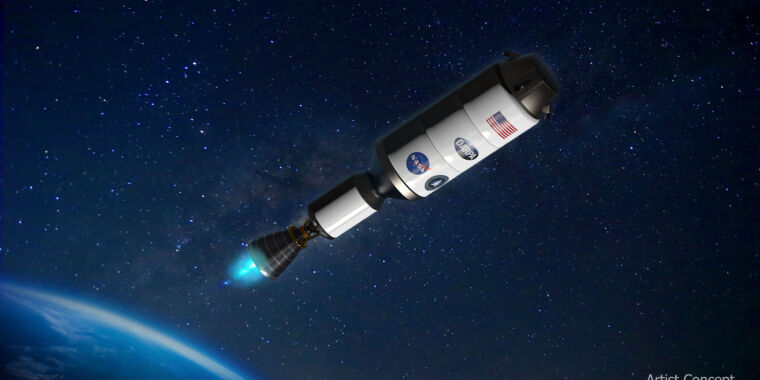Four years from now, if all goes well, a nuclear-powered rocket engine will launch into space for the first time. The rocket itself will be conventional, but the payload boosted into orbit will be a different matter.
So excited to see nuclear thermal propulsion actually flying. We were so close with project NERVA back in the 70s
Sounds risky AF
- If the rocket explodes, nuclear fuel could fall back to earth
- If not de-orbited properly, the nuclear fuel could end up scattered across a country - This already happened… multiple times… in 1973 1977, 1983
- If something goes wrong in orbit, now we have radioactive space junk… numerous accidents have already happened many times
The higher orbit should mitigate most of those issues. There’s more space, so a dead craft is less of an issue. It takes long enough to reenter that most of the radioactivity will have decayed. The biggest issue would be a launch failure.
The biggest hazard is launching the payload, if it fails it falls out over a large area causing contamination of the nuclear fuel. The high orbit of the test vehicle lowers the risks for the other outcomes you identified, and they are planned to remain in these so called “disposal orbits” for many hundreds of years. Things can get very very far apart in space. The Russian recon satellites were operated in low earth orbit and their failures were well documented and even attempted to mitigate by the soviets, though they did fail with very bad consequences at least three times.
As with any technological advancement , there are risks, but if humanity is ever intending to become a spacefairing species, we will have to make peace with nuclear energy. It’s the only technology that comes anywhere close to making interplanetary travel feasible at large scale.
I’m really excited for the potential for truly massive deep space probes, even though my favorite propulsion system is solar-thermal
Definitely a mission to keep an eye on, but when Orion drive?
Now this feels futuristic
I don’t see much of a difference between this and current technology. NASA has been using nuclear reactors in probes and rovers for quite some time. Presently deep space probes use nuclear reactors to generate electricity. Propulsion is produced by using electricity to accelerate ions. The ions come from gas stored in cold liquid form.
I don’t see any breakthrough technology here. From what I can tell reading the article, it’s just a lightly different way of creating propulsion, pressurizing the gas with heat instead of accelerating it with an electromagnetic field. Seems like a step back actually.
Some satellites and rovers have used Radioisotope Thermoelectric Generators (RTGs), which are very different from a nuclear reactor. They use polonium-210, which generates heat, and that heat is converted to electricity with thermocouples. They are low power and inefficient.
To my knowledge no satellite, with an RTG, has ever used ion propulsion. Few interplanetary satellites have ever even used ion thrusters. Dawn, Hayabusa, and Deep Space 1 are the only I can think of, and they all used solar arrays.
Ion thrusters are super efficient, but produce extremely small amounts of thrust. They aren’t practical for getting large spacecraft to Mars. These proposed nuclear engines produce large thrust while have efficiency somewhere between regular chemical propulsion and ion propulsion.
ah yes, instead of using nuclear energy to power countries, we’re shooting the fuel into space





